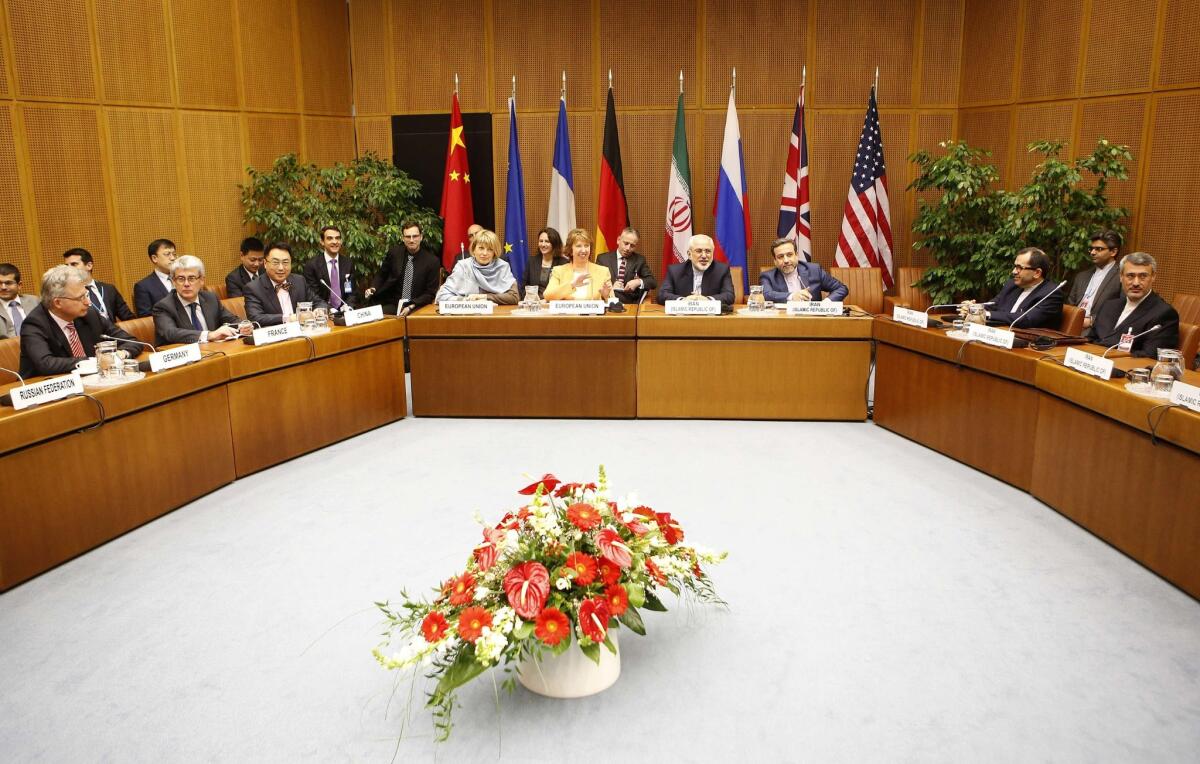Amid push for Iran nuclear deal, 2 sides maneuver to shift any blame

- Share via
Reporting from Washington — Six world powers and Iran began a three-week push Wednesday to complete a deal aimed at stopping Tehran from building a nuclear bomb, but they also started positioning themselves to deflect blame if negotiations collapse.
With the talks in Vienna gridlocked since mid-May, senior Iranian and U.S. officials have stepped up claims that they made every effort to reach a compromise while the other side pressed unrealistic demands that made an agreement impossible.
After Secretary of State John F. Kerry wrote an op-ed article urging Iran to make new concessions, Iranian Foreign Minister Mohammad Javad Zarif put out a YouTube video Wednesday in which he said the West pursued “a game of chicken in an attempt to extract last-minute concessions.”
Previous Western pressure “didn’t bring the Iranian people to kneel in submission, and it will not now,” Zarif said.
If the U.S. and its five allies in the talks are willing to accept Iran’s proposed nuclear enrichment program, Tehran can cooperate with the West on other concerns, such as Sunni Muslim militants’ seizure of territory in Iraq, Zarif said.
Iran and the six powers — Britain, France, Germany, Russia, China and the United States — are seeking a comprehensive deal that would ease tough international sanctions on Iran’s economy if Tehran accepts curbs designed to prevent it from gaining the capability to build a nuclear bomb. Iran denies any intention of building a bomb.
Analysts said the latest public jabs from Zarif and Kerry were a sign of trouble for a potential deal, which President Obama has identified as a top national security priority.
“This messaging is to prepare the ground in case there’s no progress and talks collapse,” said Ali Vaez, an Iran specialist with International Crisis Group, a nonprofit organization in Washington. He added, “This is a bad sign.”
The negotiators have been unable to close three major gaps: the number of centrifuges Iran will be permitted to operate to enrich uranium as part of the deal; the duration of the agreement; and the schedule for lifting the U.S., United Nations and European Union sanctions that have crippled Iran’s economy.
Negotiators are aiming for a deal by a July 20 deadline. They can seek a six-month extension of negotiations under the interim nuclear deal signed in November.
They may, however, need to make progress in the next three weeks to justify seeking months of additional talks, Vaez said.
Iranian and Western officials are under strong domestic political pressure not to agree to a deal on lenient terms.
Both sides thus began negotiations with ambitious demands: the six powers insisted that Iran be limited to a few hundred centrifuges to provide fuel for civilian power plants, while Iran has vowed to operate tens of thousands of centrifuges, diplomats said.
Iranian officials insist they will not disable key parts of their $100-billion nuclear infrastructure, statements that may make it harder for them to make concessions later.
The Obama administration has sent the State Department’s No. 2 diplomat, Deputy Secretary William J. Burns, and the No. 3 diplomat, Undersecretary Wendy Sherman, to Vienna for the latest round of talks.
Burns, who was key in the secret U.S.-Iranian talks that opened the way for the interim deal last year, is perceived by Iran as being more flexible than Sherman.
Kerry may also show up in Vienna to try to advance the talks, or at least to try to show that the administration has made every effort to seal the deal.
For foreign policy news, follow @richtpau
More to Read
Sign up for Essential California
The most important California stories and recommendations in your inbox every morning.
You may occasionally receive promotional content from the Los Angeles Times.














